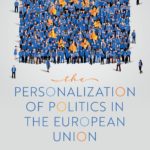 In many spheres of life, organizations invest heavily in attempts to personalize both how they communicate with customers and also what products and services are delivered to them. In politics, however, this doesn’t seem to occur, and instead, broad platitudes dominate, with politicians hoping that they cover enough of the population to carry the vote. Instead, when we talk about personalization in politics, we generally refer to a focus on individual politicians rather than their parties.
In many spheres of life, organizations invest heavily in attempts to personalize both how they communicate with customers and also what products and services are delivered to them. In politics, however, this doesn’t seem to occur, and instead, broad platitudes dominate, with politicians hoping that they cover enough of the population to carry the vote. Instead, when we talk about personalization in politics, we generally refer to a focus on individual politicians rather than their parties.
A recent book by the University of Amsterdam’s Katjana Gattermann explores the attempts to personalize politics at the EU level. She suggests that the effectiveness of the efforts to date has relied upon institutional media and temporal contexts, and so have had a limited impact on citizens’ trust, awareness, or even interest in EU politics.
A reciprocal relationship
Gattermann highlights that the relationship between politics and the media is usually a reciprocal one, with the media holding politicians to account, and politicians using the media to get publicity. She highlights how often politicians themselves become the focal point of coverage in a trend that makes politics very personal. She explains that while this is commonplace in national politics, it’s much less so in European Union politics.
“Institutions are important because the formal personalization of rules and procedures enables media and ultimately citizens to hold responsible decision-makers to account,” she explains.
It’s also important that the politicians themselves make themselves sufficiently available, as if they don’t then it will make it hard for the media to accurately inform the public.
“If personalization does not occur in the behavior of politicians, the media will likely have a hard time informing citizens about the achievements of their representatives,” Gattermann says. “And if media do not pick up on more personalized behavior they fail to provide a link between representatives and those they represent.”
Lack of impact
The attempts at personalization don’t appear to have had much of an impact on citizen trust in the EU, however, and certainly not in terms of convincing people that the EU was responsive to their concerns.
“Ultimately, institutions provide more effective cues than individual politicians both for media to inform citizens about European Union politics and for citizens to acquire information that may help them understand and evaluate European Union politics,” Gattermann explains.
Undeterred, however, she believes that the media generally focuses too much on institutions and not enough on individuals. This, therefore, prevents people from having sufficient information to truly understand the political landscape.